This post has saved me several times. I just want to add my two cents.
For those that dont like to use ORMs, and instead write their own DAL classes, when you have like 20 columns in a table, and 40 different tables with their respective CRUD operations, its painful and a waste of time. I repeated the above code, for generating CRUD methods based on the table entity and properties.
declare @TableName sysname = 'Tablename'
declare @Result varchar(max) = 'public class ' + @TableName + '
{'
select @Result = @Result + '
public ' + ColumnType + NullableSign + ' ' + ColumnName + ' { get; set; }
'
from
(
select
replace(col.name, ' ', '_') ColumnName,
column_id ColumnId,
case typ.name
when 'bigint' then 'long'
when 'binary' then 'byte[]'
when 'bit' then 'bool'
when 'char' then 'string'
when 'date' then 'DateTime'
when 'datetime' then 'DateTime'
when 'datetime2' then 'DateTime'
when 'datetimeoffset' then 'DateTimeOffset'
when 'decimal' then 'decimal'
when 'float' then 'float'
when 'image' then 'byte[]'
when 'int' then 'int'
when 'money' then 'decimal'
when 'nchar' then 'char'
when 'ntext' then 'string'
when 'numeric' then 'decimal'
when 'nvarchar' then 'string'
when 'real' then 'double'
when 'smalldatetime' then 'DateTime'
when 'smallint' then 'short'
when 'smallmoney' then 'decimal'
when 'text' then 'string'
when 'time' then 'TimeSpan'
when 'timestamp' then 'DateTime'
when 'tinyint' then 'byte'
when 'uniqueidentifier' then 'Guid'
when 'varbinary' then 'byte[]'
when 'varchar' then 'string'
else 'UNKNOWN_' + typ.name
end ColumnType,
case
when col.is_nullable = 1 and typ.name in ('bigint', 'bit', 'date', 'datetime', 'datetime2', 'datetimeoffset', 'decimal', 'float', 'int', 'money', 'numeric', 'real', 'smalldatetime', 'smallint', 'smallmoney', 'time', 'tinyint', 'uniqueidentifier')
then '?'
else ''
end NullableSign
from sys.columns col
join sys.types typ on
col.system_type_id = typ.system_type_id AND col.user_type_id = typ.user_type_id
where object_id = object_id(@TableName)
) t
order by ColumnId
set @Result = @Result + '
}'
print @Result
declare @InitDataAccess varchar(max) = 'public class '+ @TableName +'DataAccess
{ '
declare @ListStatement varchar(max) ='public List<'+@TableName+'> Get'+@TableName+'List()
{
String conn = ConfigurationManager.ConnectionStrings["ConnectionNameInWeb.config"].ConnectionString;
var itemList = new List<'+@TableName+'>();
try
{
using (var sqlCon = new SqlConnection(conn))
{
sqlCon.Open();
var cmd = new SqlCommand
{
Connection = sqlCon,
CommandType = CommandType.StoredProcedure,
CommandText = "StoredProcedureSelectAll"
};
SqlDataReader reader = cmd.ExecuteReader();
while (reader.Read())
{
var item = new '+@TableName+'();
'
select @ListStatement = @ListStatement + '
item.'+ ColumnName + '= ('+ ColumnType + NullableSign +')reader["'+ColumnName+'"];
'
from
(
select
replace(col.name, ' ', '_') ColumnName,
column_id ColumnId,
case typ.name
when 'bigint' then 'long'
when 'binary' then 'byte[]'
when 'bit' then 'bool'
when 'char' then 'string'
when 'date' then 'DateTime'
when 'datetime' then 'DateTime'
when 'datetime2' then 'DateTime'
when 'datetimeoffset' then 'DateTimeOffset'
when 'decimal' then 'decimal'
when 'float' then 'float'
when 'image' then 'byte[]'
when 'int' then 'int'
when 'money' then 'decimal'
when 'nchar' then 'char'
when 'ntext' then 'string'
when 'numeric' then 'decimal'
when 'nvarchar' then 'string'
when 'real' then 'double'
when 'smalldatetime' then 'DateTime'
when 'smallint' then 'short'
when 'smallmoney' then 'decimal'
when 'text' then 'string'
when 'time' then 'TimeSpan'
when 'timestamp' then 'DateTime'
when 'tinyint' then 'byte'
when 'uniqueidentifier' then 'Guid'
when 'varbinary' then 'byte[]'
when 'varchar' then 'string'
else 'UNKNOWN_' + typ.name
end ColumnType,
case
when col.is_nullable = 1 and typ.name in ('bigint', 'bit', 'date', 'datetime', 'datetime2', 'datetimeoffset', 'decimal', 'float', 'int', 'money', 'numeric', 'real', 'smalldatetime', 'smallint', 'smallmoney', 'time', 'tinyint', 'uniqueidentifier')
then '?'
else ''
end NullableSign
from sys.columns col
join sys.types typ on
col.system_type_id = typ.system_type_id AND col.user_type_id = typ.user_type_id
where object_id = object_id(@TableName)
) t
order by ColumnId
select @ListStatement = @ListStatement +'
itemList.Add(item);
}
}
}
catch (Exception ex)
{
throw new Exception(ex.Message);
}
return itemList;
}'
declare @GetIndividual varchar(max) =
'public '+@TableName+' Get'+@TableName+'()
{
String conn = ConfigurationManager.ConnectionStrings["ConnectionNameInWeb.config"].ConnectionString;
var item = new '+@TableName+'();
try
{
using (var sqlCon = new SqlConnection(conn))
{
sqlCon.Open();
var cmd = new SqlCommand
{
Connection = sqlCon,
CommandType = CommandType.StoredProcedure,
CommandText = "StoredProcedureSelectIndividual"
};
cmd.Parameters.AddWithValue("@ItemCriteria", item.id);
SqlDataReader reader = cmd.ExecuteReader();
if (reader.Read())
{'
select @GetIndividual = @GetIndividual + '
item.'+ ColumnName + '= ('+ ColumnType + NullableSign +')reader["'+ColumnName+'"];
'
from
(
select
replace(col.name, ' ', '_') ColumnName,
column_id ColumnId,
case typ.name
when 'bigint' then 'long'
when 'binary' then 'byte[]'
when 'bit' then 'bool'
when 'char' then 'string'
when 'date' then 'DateTime'
when 'datetime' then 'DateTime'
when 'datetime2' then 'DateTime'
when 'datetimeoffset' then 'DateTimeOffset'
when 'decimal' then 'decimal'
when 'float' then 'float'
when 'image' then 'byte[]'
when 'int' then 'int'
when 'money' then 'decimal'
when 'nchar' then 'char'
when 'ntext' then 'string'
when 'numeric' then 'decimal'
when 'nvarchar' then 'string'
when 'real' then 'double'
when 'smalldatetime' then 'DateTime'
when 'smallint' then 'short'
when 'smallmoney' then 'decimal'
when 'text' then 'string'
when 'time' then 'TimeSpan'
when 'timestamp' then 'DateTime'
when 'tinyint' then 'byte'
when 'uniqueidentifier' then 'Guid'
when 'varbinary' then 'byte[]'
when 'varchar' then 'string'
else 'UNKNOWN_' + typ.name
end ColumnType,
case
when col.is_nullable = 1 and typ.name in ('bigint', 'bit', 'date', 'datetime', 'datetime2', 'datetimeoffset', 'decimal', 'float', 'int', 'money', 'numeric', 'real', 'smalldatetime', 'smallint', 'smallmoney', 'time', 'tinyint', 'uniqueidentifier')
then '?'
else ''
end NullableSign
from sys.columns col
join sys.types typ on
col.system_type_id = typ.system_type_id AND col.user_type_id = typ.user_type_id
where object_id = object_id(@TableName)
) t
order by ColumnId
select @GetIndividual = @GetIndividual +'
}
}
}
catch (Exception ex)
{
throw new Exception(ex.Message);
}
return item;
}'
declare @InsertStatement varchar(max) = 'public void Insert'+@TableName+'('+@TableName+' item)
{
String conn = ConfigurationManager.ConnectionStrings["ConnectionNameInWeb.config"].ConnectionString;
try
{
using (var sqlCon = new SqlConnection(conn))
{
sqlCon.Open();
var cmd = new SqlCommand
{
Connection = sqlCon,
CommandType = CommandType.StoredProcedure,
CommandText = "StoredProcedureInsert"
};
'
select @InsertStatement = @InsertStatement + '
cmd.Parameters.AddWithValue("@'+ColumnName+'", item.'+ColumnName+');
'
from
(
select
replace(col.name, ' ', '_') ColumnName,
column_id ColumnId,
case typ.name
when 'bigint' then 'long'
when 'binary' then 'byte[]'
when 'bit' then 'bool'
when 'char' then 'string'
when 'date' then 'DateTime'
when 'datetime' then 'DateTime'
when 'datetime2' then 'DateTime'
when 'datetimeoffset' then 'DateTimeOffset'
when 'decimal' then 'decimal'
when 'float' then 'float'
when 'image' then 'byte[]'
when 'int' then 'int'
when 'money' then 'decimal'
when 'nchar' then 'char'
when 'ntext' then 'string'
when 'numeric' then 'decimal'
when 'nvarchar' then 'string'
when 'real' then 'double'
when 'smalldatetime' then 'DateTime'
when 'smallint' then 'short'
when 'smallmoney' then 'decimal'
when 'text' then 'string'
when 'time' then 'TimeSpan'
when 'timestamp' then 'DateTime'
when 'tinyint' then 'byte'
when 'uniqueidentifier' then 'Guid'
when 'varbinary' then 'byte[]'
when 'varchar' then 'string'
else 'UNKNOWN_' + typ.name
end ColumnType,
case
when col.is_nullable = 1 and typ.name in ('bigint', 'bit', 'date', 'datetime', 'datetime2', 'datetimeoffset', 'decimal', 'float', 'int', 'money', 'numeric', 'real', 'smalldatetime', 'smallint', 'smallmoney', 'time', 'tinyint', 'uniqueidentifier')
then '?'
else ''
end NullableSign
from sys.columns col
join sys.types typ on
col.system_type_id = typ.system_type_id AND col.user_type_id = typ.user_type_id
where object_id = object_id(@TableName)
) t
order by ColumnId
select @InsertStatement = @InsertStatement +'
cmd.ExecuteNonQuery();
}
}
catch (Exception ex)
{
throw new Exception(ex.Message);
}
}'
declare @UpdateStatement varchar(max) = 'public void Update'+@TableName+'('+@TableName+' item)
{
String conn = ConfigurationManager.ConnectionStrings["ConnectionNameInWeb.config"].ConnectionString;
try
{
using (var sqlCon = new SqlConnection(conn))
{
sqlCon.Open();
var cmd = new SqlCommand
{
Connection = sqlCon,
CommandType = CommandType.StoredProcedure,
CommandText = "StoredProcedureUpdate"
};
cmd.Parameters.AddWithValue("@UpdateCriteria", item.Id);
'
select @UpdateStatement = @UpdateStatement + '
cmd.Parameters.AddWithValue("@'+ColumnName+'", item.'+ColumnName+');
'
from
(
select
replace(col.name, ' ', '_') ColumnName,
column_id ColumnId,
case typ.name
when 'bigint' then 'long'
when 'binary' then 'byte[]'
when 'bit' then 'bool'
when 'char' then 'string'
when 'date' then 'DateTime'
when 'datetime' then 'DateTime'
when 'datetime2' then 'DateTime'
when 'datetimeoffset' then 'DateTimeOffset'
when 'decimal' then 'decimal'
when 'float' then 'float'
when 'image' then 'byte[]'
when 'int' then 'int'
when 'money' then 'decimal'
when 'nchar' then 'char'
when 'ntext' then 'string'
when 'numeric' then 'decimal'
when 'nvarchar' then 'string'
when 'real' then 'double'
when 'smalldatetime' then 'DateTime'
when 'smallint' then 'short'
when 'smallmoney' then 'decimal'
when 'text' then 'string'
when 'time' then 'TimeSpan'
when 'timestamp' then 'DateTime'
when 'tinyint' then 'byte'
when 'uniqueidentifier' then 'Guid'
when 'varbinary' then 'byte[]'
when 'varchar' then 'string'
else 'UNKNOWN_' + typ.name
end ColumnType,
case
when col.is_nullable = 1 and typ.name in ('bigint', 'bit', 'date', 'datetime', 'datetime2', 'datetimeoffset', 'decimal', 'float', 'int', 'money', 'numeric', 'real', 'smalldatetime', 'smallint', 'smallmoney', 'time', 'tinyint', 'uniqueidentifier')
then '?'
else ''
end NullableSign
from sys.columns col
join sys.types typ on
col.system_type_id = typ.system_type_id AND col.user_type_id = typ.user_type_id
where object_id = object_id(@TableName)
) t
order by ColumnId
select @UpdateStatement = @UpdateStatement +'
cmd.ExecuteNonQuery();
}
}
catch (Exception ex)
{
throw new Exception(ex.Message);
}
}'
declare @EndDataAccess varchar(max) = '
}'
print @InitDataAccess
print @GetIndividual
print @InsertStatement
print @UpdateStatement
print @ListStatement
print @EndDataAccess
Of course its not bulletproof code, and can be improved. Just wanted to contribute to this excelent solution





